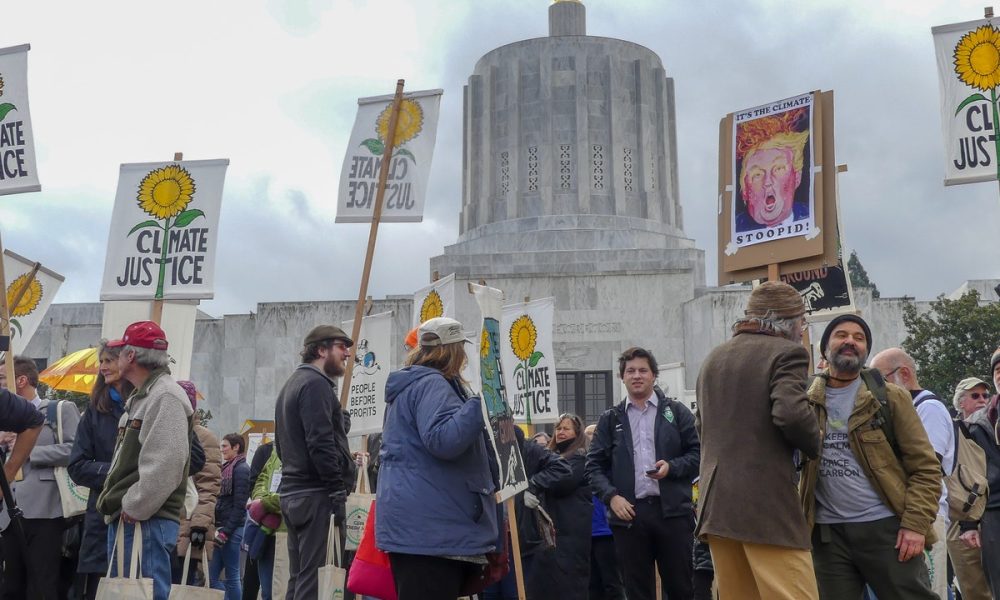 Oregonians pushing cap and trade rally outside of the Capitol. (Aubrey Wieber/Salem Reporter)
Oregonians pushing cap and trade rally outside of the Capitol. (Aubrey Wieber/Salem Reporter)
For months, the conversation around Oregon’s proposed carbon program has revolved around how it will impact industrial polluters.
On Monday, a public hearing focused on mitigating anticipated gas price increases to soften the new environmental policy’s affect on low-income Oregonians.
The public hearing on House Bill 3425 kept the Joint Committee on Carbon Reduction busy as legislative lawyers worked through the scores of amendments.
Under the cap and trade proposal, the state would limit certain carbon emissions. Selected industries emitting at least 25,000 metric tons of greenhouse gasses per year would have to pay for every ton of pollutants. To do that, they would buy allowances from the state through an auction.
Commodities such as energy, natural gas and gasoline are expected to become more expensive. The cap and trade program has a built-in mechanism of free allowances to natural gas and electric utilities to keep Oregonians from feeling the full extent of those price increases.
After weeks of public hearings in Salem and around the state, the committee repeatedly heard concerns from low-income Oregonians afraid of how the program would push gas prices.
The Governor’s Office estimated that if cap and trade went into effect in 2021, there would be an immediate 15 to 16 cent per-gallon increase. That’s because fuel companies will have to by allowances to offset trucking gas and diesel around the state.
Under a new proposal, the state would calculate a tax credit based on driving distances in certain regions of the state and the increase in gas prices. The credit would be given to individuals who are at 100 percent of area median income or less.
Estimates show cap and trade would cost drivers about $100 per year.
“Some people may not be made entirely whole,” Sen. Michael Dembrow, D-Portland, said. “We are not going to track every mile they are driving, but it will be close.”
The credit would not be given to businesses or government.
 Rep. Karin Power, D-Milwaukie, talks during a cap and trade rally. She is a co-chair on the committee overseeing the proposal. (Aubrey Wieber/Salem Reporter)
Rep. Karin Power, D-Milwaukie, talks during a cap and trade rally. She is a co-chair on the committee overseeing the proposal. (Aubrey Wieber/Salem Reporter)
Rep. Karin Power, D- Milwaukie, said she’s working with the Oregon Department of Revenue to make sure vehicle owners making too little to pay taxes still get the credit via a refund.
Power said the tax credit responds to concerns she heard from low-income Oregonians worried about the financial impacts of carbon pricing.
Gas price increases were used often as ammunition from Republicans attacking the cap and trade program. Immediately following the hearing, business coalition Partnership for Oregon Communities attacked the bill.
“It’s refreshing to hear lawmakers acknowledge the very real concerns that everyday Oregonians have raised about the significant increased costs of gasoline and energy consumers would face under HB 2020,” spokesman Preston Mann said in a news release. “Unfortunately, an ill-conceived gas tax rebate won’t save them from the cost increases they would face under cap and trade, which would continue to ratchet up each and every year of the program.”
Sen. Cliff Bentz, R-Ontario, was confounded. Bentz has long been a foe of Democrats on the committee pushing cap and trade. He favors a policy that would tax carbon and then give the money back through a tax credit. That way, he said, you incentivize people and industry to pollute less without hurting and overhauling the economy.
In Monday’s hearing, Bentz argued the gas tax credit essentially does that for about 750,000 low-income Oregonians. He suggested the committee reconsider his original carbon tax proposal.
Power said House Bill 3425 addresses certain concerns while keeping the intent of the cap and trade program. The committee will wait to vote on the bill until an amended version is ready.
Reporter Aubrey Wieber: [email protected] or 503-575-1251. Wieber is a reporter for Salem Reporter who works for the Oregon Capital Bureau, a collaboration of EO Media Group, the Pamplin Media Group, and Salem Reporter.
TRY A FREE SAMPLE – You can see for yourself the kind of local news reporting brought to you by the team of professional reporters at Salem Reporter. You can read us for free for 30 days. Signing up is easy and gives you 24/7 access to our reports. Sign up HERE.









